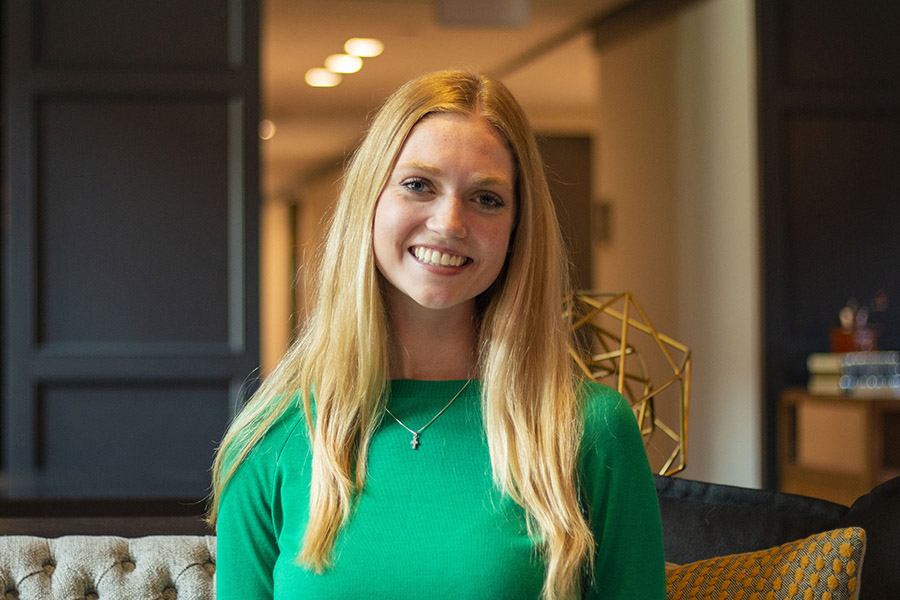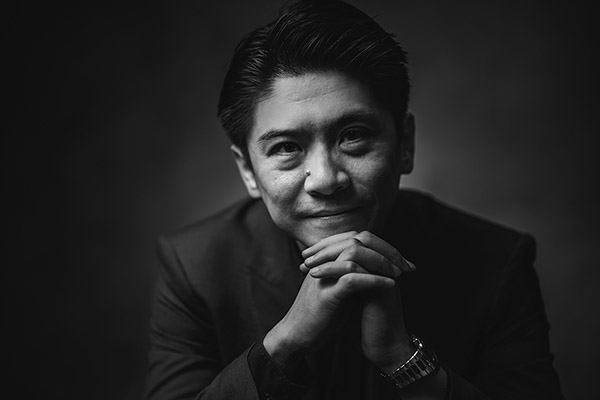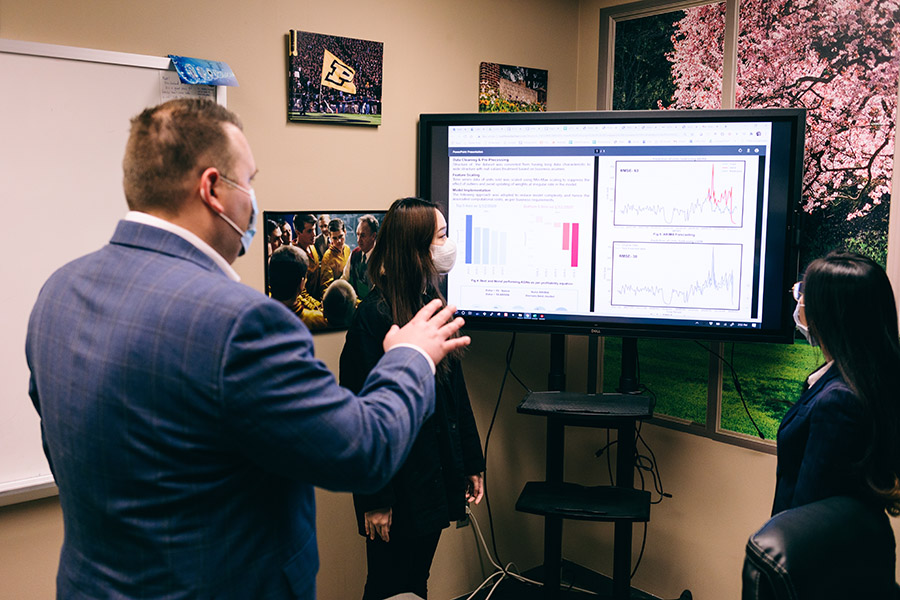
Profiles in Research - School recognizes faculty’s scholarly achievements
In tandem with teaching, research is central to the Krannert School’s mission and vision.
Over the past seven years, Krannert has used fundraising and revenue from residential master’s and online programs to invest in research excellence. The school has increased Science to Achieve Results (STAR) research program funding by 30%; boosted PhD stipends to $24-29k and offered doctoral students up to $50k per year in research funding; and awarded annual funding for data purchases and business ethics research.
In addition, the school has launched or supported growth in research centers, increased research computing infrastructure, and disbursed an average of $1M per year in revenue sharing with area and departments for summer merit pay, PhD stipends, speakers/conferences and research support.
Each spring, Krannert also recognizes select faculty with awards for their research excellence and scholarly achievements. In this issue, we introduce you to the five most recent honorees.
Jay Ross Young Faculty Scholar Award — Wei Sun
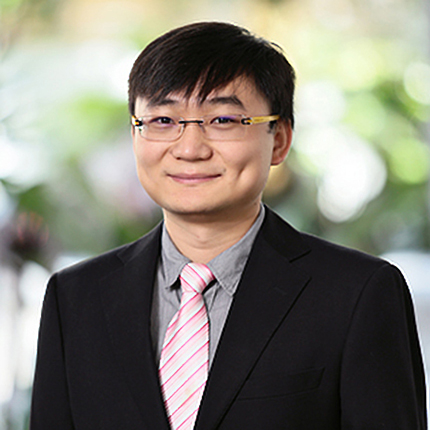
The Jay Ross Young Faculty Scholar Award recognizes research accomplishments and potential. This year’s recipient is Wei Sun, who joined the Krannert quantitative methods faculty in 2019. Before coming back to Purdue, where he received both a master’s degree and doctorate in statistics, he was on the faculty at University of Miami and served as a research scientist with Yahoo Labs.
Returning to Purdue was an easy decision. “Krannert is one of the few business schools that is investing heavily in data science,” Sun says. “The school promotes interdisciplinary collaborations that are crucial to my research area. West Lafayette is also my second home. My family really enjoys living in this peaceful and friendly college town.”
Sun’s general area of expertise is machine learning, including reinforcement learning and deep learning, with applications in computational advertising, dynamic pricing and neuroimaging analysis.
“Machine learning has become the brain behind business intelligence and has been widely used in our daily life, including Google search, Amazon product recommendation, Uber pricing, Facebook social media feeds, and credit card fraud detection,” Sun says. “Machine learning also helps revolutionize other fields, from personalized medicine to autonomous driving and education to manufacturing. My focus is on developing cutting-edge machine learning methods and understanding underlying theoretical mechanisms.”
Sun says his research has implications for not only academia, but also his work with corporate partners and students.
“My research applies novel machine learning methods to a few data science fields,” he says. “For example, my recent collaborative work with Neuroscientist helps early diagnosis of Alzheimer’s disease, my work with Deepmind improves the efficiency and accuracy in personalized online decision making, and my work with Yahoo labs directly impacts marketing strategy and management decisions in online advertising.
“On the educational level, I have incorporated some of my recent research results into my data mining course to help stimulate students’ interests and broaden their views in this field. Some of the research is incorporated into the training and mentoring of PhD students, which in turn helps their career developments.”
For Sun, the most rewarding and challenging aspects of his research are intertwined.
“I feel satisfied when my research makes an impact, solves a new and interesting real problem, or provides a novel theoretical understanding of longstanding unsolved problems,” he says. “The impactful research work always comes with great challenges. Not every project will be successful in the end. The most exciting element of the research process is the uncertainty.”
Krannert Young Faculty Scholar Award — Luis Rios
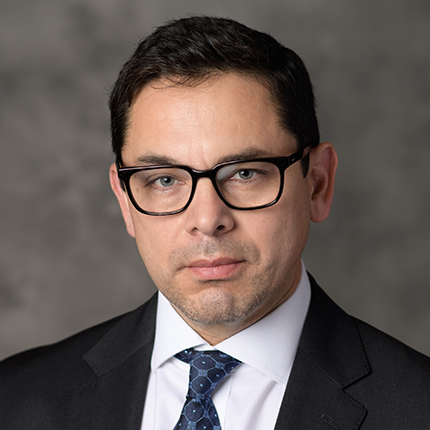
The Krannert Young Faculty Scholar Award also recognizes research accomplishments and potential. This year’s recipient is Luis Rios, who joined the strategic management faculty in 2020. After earning his doctorate from Duke University, he was on the faculty at the Wharton School before joining Purdue. His published research articles include the interplay between research, external knowledge and firm structure, capital markets and firm organization, and organizational change and the dynamics of innovation.
“I had always wanted to be an academic, but thought I would pursue the humanities,” Rios says. “Then after college I ended up working in business and developed a passion for understanding how organizations work. After a few years, I decided to take the plunge and go back to school for my PhD.”
While earning his doctorate, Rios took a keen interest in technology. “My advisors at Duke were instrumental in showing me why technological innovation matters so much,” he says. “I knew I cared about organizational structure in general, but they guided me towards discovering how profoundly technology affects our world.”
Rios says joining the faculty at Krannert reinforced his path in academia. “I was excited to be situated within such a research and technology powerhouse,” he says. “I am interested in how firms can better manage the process of innovation, with a focus on tacit and social processes, because there is still so much we don’t know about what works or doesn’t work when it comes to organizing such activities.”
For Rios, the most challenging elements of research are the need to bridge disparate perspectives and literatures in order to provide answers to the questions being asked. “Engaging with broad, diverse audiences necessitates a broad set of skills and excellent collaborators, for example from economics, sociology, modeling, and core strategy,” he says. “This is of course also the most satisfying element of my work.”
Going forward, Rios says research and technology will continue to leverage each other.
“It has been said that today, every firm is a technology firm,” he says. “Being able to provide empirical evidence of what practices may help generate valuable technological knowledge is important for old and new companies alike, even for those that are just now starting to engage in research.”
Krannert Faculty Fellow — Yaroslav Rosokha
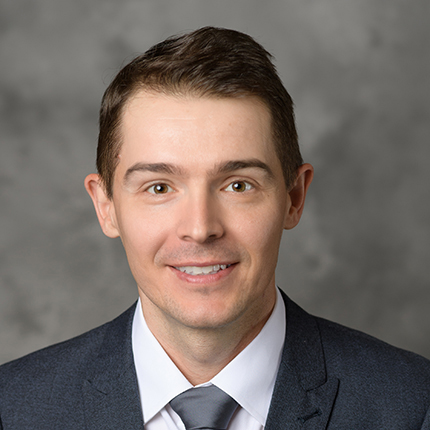
The Krannert Faculty Fellow award is presented for achievement of and/or potential for a strong and continued record of scholarly research. This year’s recipient is Yaroslav Rosokha, who joined Krannert in 2013 after earning a PhD from the University of Texas at Austin. His research interests include behavioral economics, game theory, computational economics and agent-based models.
An early interest in how people make decisions spurred Rosokha’s journey into academia. “I’m curious about psychological factors or social factors that may influence the decision-making process,” he says. “My field of experimental and behavioral economics looks at it from a very micro-level perspective.”
Rosokha has several streams of research, including individual decision-making under uncertainty and decision-making in strategic settings, with a particular focus on repeated interactions in social dilemmas. “I'm interested in how people learn to cooperate and what factors may lead hinder or promote cooperation,” he says.
Another area of research focus for Rosokha is agent-based computational economics, which studies economic processes as dynamic systems of interacting agents rather than rational models. “In agent-based computational economics, you program simple boundedly rational agents and let them interact,” he says. “The outcome of these interactions can provide a different perspective on the question of interest.”
During his time at Purdue, Rosokha has received numerous teaching and research honors. On the research front, Rosokha earned a Purdue Research Foundation Award and has received several PRF International Travel Grants. Most recently, a research collaboration between Rosokha and Sergay Gavrilets at the University of Tennessee received one of 17 Defense Established Program to Stimulate Research (DEPSCoR) awards from the Department of Defense. DEPSCoR is a congressionally mandated, capacity-building program designed to strengthen the basic research infrastructure at institutions of higher education.
Rosokha and his research team will examine the dynamics of beliefs, power, and inequality in within- and between-group cooperation and conflict. “Economic, social, and political inequality among individuals and groups is a common driving force behind the social unrest in developed and developing countries,” Rosokha says. “The aim of our project is to theoretically and experimentally study the extent to which such inequality contributes to the fragility of cooperation among individuals and groups, and to identify the behavioral aspects that may alleviate or exacerbate the problem.”
Rising Star Professorship — Deniz Yavuz
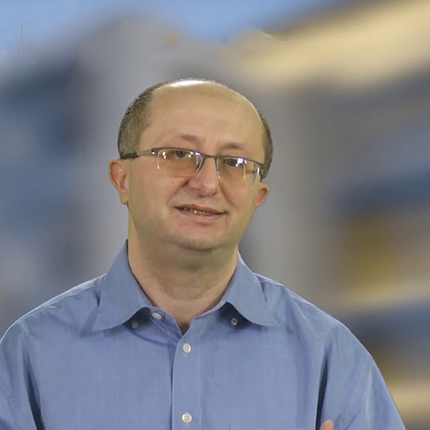
A Rising Star Professorship can be held up to five years and is intended to reward highly productive faculty with a designation of excellence. It is primarily aimed at associate professors, though exceptional assistant professors and recently promoted full professors can be considered. This year’s recipient is Deniz Yavuz, who earned a doctorate from Yale University and served on the faculties at Arizona State University and Washington University before joining the Krannert finance faculty in 2010. He also has work experience in corporate banking and project finance. In addition to several teaching honors, he received the Institute for Quantitative Investment Research Europe Award in 2020.
“I came to the U.S. to pursue an MBA degree at Yale and my plan afterwards was to work on financing infrastructure development projects within multinational institutions such as World Bank,” Yavuz says. “A faculty member suggested that I should enroll in the PhD program and pursue a career in academia. I realized that I can both stay in academic environment, which I enjoyed a lot, and have impact on how people think about important issues in real life.”
Yavuz’s PhD is in financial economics. “I was dazzled by some of the research topics in economics and finance that focus on efficient allocation of capital and economic growth,” he says. “Krannert has an excellent group of research-active faculty and a supportive environment for doing cross-disciplinary work.”
Yavuz enjoys research work that involves policy implications. “Recently, I am working on cases when the functioning of financial institutions and markets fail due to agency issues,” he says. “For example, one of my recent papers documents that public pension plan managers are more likely to allocate funds to investment firms with which they have a personal connection. In another paper, we document that business groups mitigate incorporation of information into stocks prices, with negative implications for efficiency of capital allocation.”
One of the key messages from his most recent research is that connections influence pension fund allocations and in doing so impose costs. “Who bears these costs? For public pension systems where the opportunity costs of poor choices appear to be particularly large, these costs are born by taxpayers as the residual claimants,” he says. “How large are these costs? As a simple back of the envelope calculation, even a 50-basis point friction multiplied by $1.6 trillion in mandates implies an aggregate dollar cost of $8 billion. Our paper has implications for pension fund reform, transparency and the decision-making process.”
University Faculty Scholar — Brian Roberson
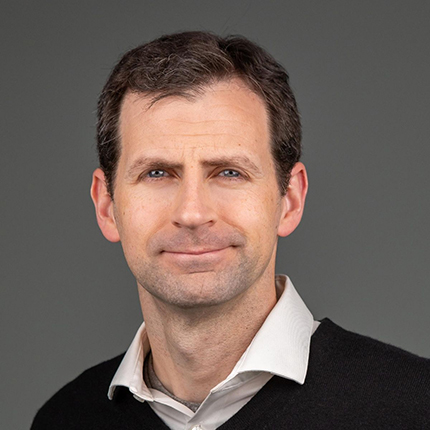
The University Faculty Scholar honor recognizes faculty who hold the rank of tenured associate or full professor and are on an accelerated path to academic distinction. This year’s recipient is Brian Roberson, who earned his doctorate in economics from Purdue before joining the Miami University faculty. He returned to Krannert in 2010. In addition to his research, which focuses on game theory, economic theory, political economy and public economics, he has served as director of the economics doctoral program since 2017.
It was a combination of research and teaching that drew Roberson to academia.
“I really enjoy contributing to the discovery of knowledge and being involved with innovative education programs that prepare our students for careers in business, government and academia,” he says. “We have great students here at Purdue at both the undergraduate and graduate levels. Being at a premier STEM university is ideal given my research interests, and I have a great group of colleagues to work with in the economics department and in Krannert more broadly.”
Economics is often defined as the study of the allocation of scarce resources, and Roberson’s research focuses on the strategic allocation of scarce resources across a set of contests. This was one of the first problems examined in modern game theory, known as the Colonel Blotto game, and has a range of applications in the economic, information, military and political sciences.
Examples include networked oligopoly and competition involving interconnected product lines; information systems security and the defense of complex networks of targets; and political campaigns and political lobbying involving competition over multiple voters and/or constituencies. Due to recent theoretical developments, including work by Roberson, the Colonel Blotto game has experienced a resurgence of interest across multiple disciplines. “It’s an interesting and dynamic subfield to be working in,” he says.
“Regarding the choice to study economics, the different disciplines within the social sciences all provide valuable lenses or viewpoints for understanding the world and approaching new problems, but for me, strategic environments and the game-theoretical approach to the study of strategy were and are particularly attractive,” Roberson says.

